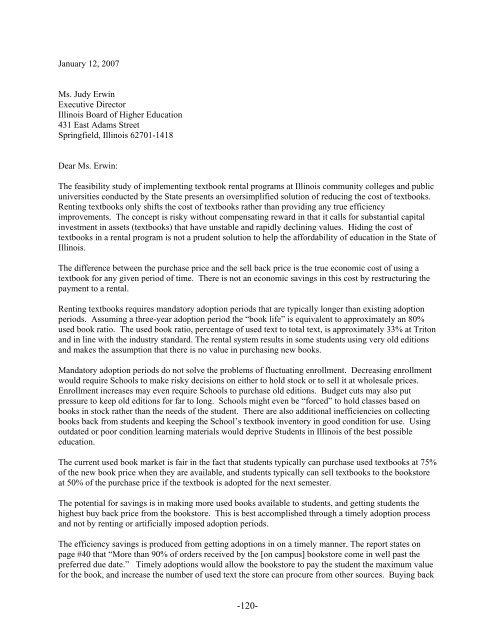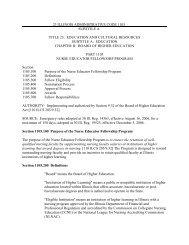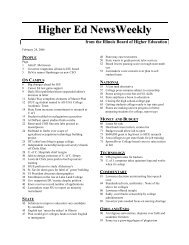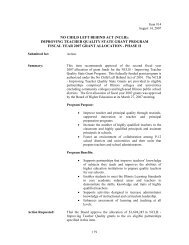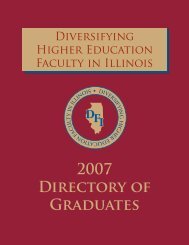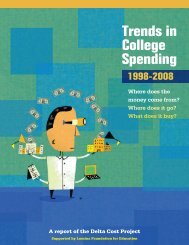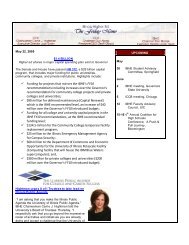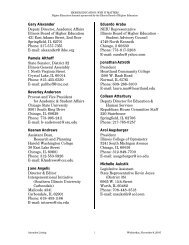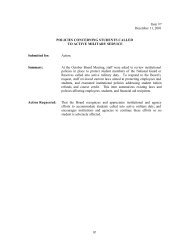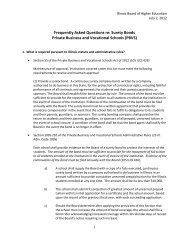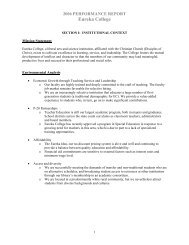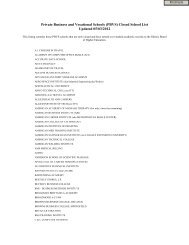A Report on the Feasibility of Textbook Rental - IBHE
A Report on the Feasibility of Textbook Rental - IBHE
A Report on the Feasibility of Textbook Rental - IBHE
You also want an ePaper? Increase the reach of your titles
YUMPU automatically turns print PDFs into web optimized ePapers that Google loves.
January 12, 2007Ms. Judy ErwinExecutive DirectorIllinois Board <strong>of</strong> Higher Educati<strong>on</strong>431 East Adams StreetSpringfield, Illinois 62701-1418Dear Ms. Erwin:The feasibility study <strong>of</strong> implementing textbook rental programs at Illinois community colleges and publicuniversities c<strong>on</strong>ducted by <strong>the</strong> State presents an oversimplified soluti<strong>on</strong> <strong>of</strong> reducing <strong>the</strong> cost <strong>of</strong> textbooks.Renting textbooks <strong>on</strong>ly shifts <strong>the</strong> cost <strong>of</strong> textbooks ra<strong>the</strong>r than providing any true efficiencyimprovements. The c<strong>on</strong>cept is risky without compensating reward in that it calls for substantial capitalinvestment in assets (textbooks) that have unstable and rapidly declining values. Hiding <strong>the</strong> cost <strong>of</strong>textbooks in a rental program is not a prudent soluti<strong>on</strong> to help <strong>the</strong> affordability <strong>of</strong> educati<strong>on</strong> in <strong>the</strong> State <strong>of</strong>Illinois.The difference between <strong>the</strong> purchase price and <strong>the</strong> sell back price is <strong>the</strong> true ec<strong>on</strong>omic cost <strong>of</strong> using atextbook for any given period <strong>of</strong> time. There is not an ec<strong>on</strong>omic savings in this cost by restructuring <strong>the</strong>payment to a rental.Renting textbooks requires mandatory adopti<strong>on</strong> periods that are typically l<strong>on</strong>ger than existing adopti<strong>on</strong>periods. Assuming a three-year adopti<strong>on</strong> period <strong>the</strong> “book life” is equivalent to approximately an 80%used book ratio. The used book ratio, percentage <strong>of</strong> used text to total text, is approximately 33% at Trit<strong>on</strong>and in line with <strong>the</strong> industry standard. The rental system results in some students using very old editi<strong>on</strong>sand makes <strong>the</strong> assumpti<strong>on</strong> that <strong>the</strong>re is no value in purchasing new books.Mandatory adopti<strong>on</strong> periods do not solve <strong>the</strong> problems <strong>of</strong> fluctuating enrollment. Decreasing enrollmentwould require Schools to make risky decisi<strong>on</strong>s <strong>on</strong> ei<strong>the</strong>r to hold stock or to sell it at wholesale prices.Enrollment increases may even require Schools to purchase old editi<strong>on</strong>s. Budget cuts may also putpressure to keep old editi<strong>on</strong>s for far to l<strong>on</strong>g. Schools might even be “forced” to hold classes based <strong>on</strong>books in stock ra<strong>the</strong>r than <strong>the</strong> needs <strong>of</strong> <strong>the</strong> student. There are also additi<strong>on</strong>al inefficiencies <strong>on</strong> collectingbooks back from students and keeping <strong>the</strong> School’s textbook inventory in good c<strong>on</strong>diti<strong>on</strong> for use. Usingoutdated or poor c<strong>on</strong>diti<strong>on</strong> learning materials would deprive Students in Illinois <strong>of</strong> <strong>the</strong> best possibleeducati<strong>on</strong>.The current used book market is fair in <strong>the</strong> fact that students typically can purchase used textbooks at 75%<strong>of</strong> <strong>the</strong> new book price when <strong>the</strong>y are available, and students typically can sell textbooks to <strong>the</strong> bookstoreat 50% <strong>of</strong> <strong>the</strong> purchase price if <strong>the</strong> textbook is adopted for <strong>the</strong> next semester.The potential for savings is in making more used books available to students, and getting students <strong>the</strong>highest buy back price from <strong>the</strong> bookstore. This is best accomplished through a timely adopti<strong>on</strong> processand not by renting or artificially imposed adopti<strong>on</strong> periods.The efficiency savings is produced from getting adopti<strong>on</strong>s in <strong>on</strong> a timely manner. The report states <strong>on</strong>page #40 that “More than 90% <strong>of</strong> orders received by <strong>the</strong> [<strong>on</strong> campus] bookstore come in well past <strong>the</strong>preferred due date.” Timely adopti<strong>on</strong>s would allow <strong>the</strong> bookstore to pay <strong>the</strong> student <strong>the</strong> maximum valuefor <strong>the</strong> book, and increase <strong>the</strong> number <strong>of</strong> used text <strong>the</strong> store can procure from o<strong>the</strong>r sources. Buying back-120-


